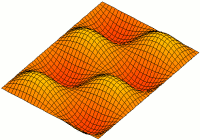
Photo from wikipedia
The fundamental concept and salient details about passive resonators in chipless radio frequency identification (RFID) technology are presented in this review article. The analysis also intends to assist the advancement… Click to show full abstract
The fundamental concept and salient details about passive resonators in chipless radio frequency identification (RFID) technology are presented in this review article. The analysis also intends to assist the advancement of chipless autoidentification technology by addressing constraints, such as price, physical footprint, and coding capacity. The study makes it clear that resonators are the fundamental building blocks of modern chipless RFID industries. They are capable enough to enhance the detection performance, encoding ability, and information storage capacity that increase the usage of the transponder in a multitude of applications in various retailing and medical domains. Importance is given to smart materials and metamaterials that utilize resonators from an industrial standpoint. This article examines current developments in RFID resonators and the problems that they inevitably bring with them, such as sensitivity, selectivity, interference, collision, polarization, and read range.
Journal Title: IEEE Transactions on Instrumentation and Measurement
Year Published: 2023
Link to full text (if available)
Share on Social Media: Sign Up to like & get
recommendations!